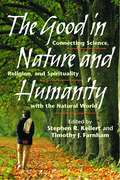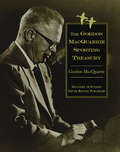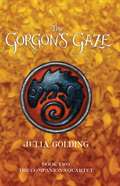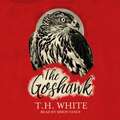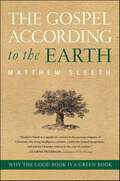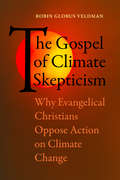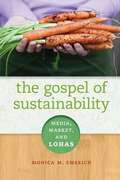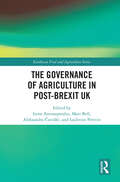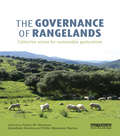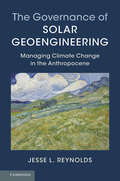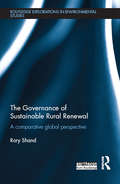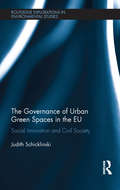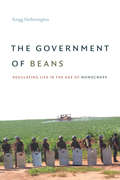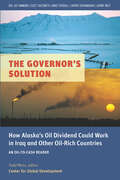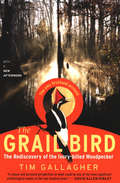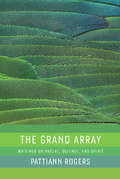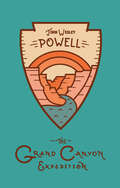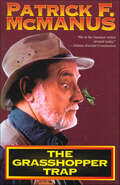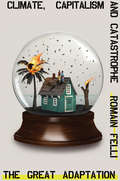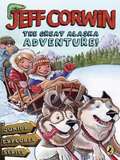- Table View
- List View
The Good in Nature and Humanity: Connecting Science, Religion, and Spirituality with the Natural World
by Stephen R. Kellert Timothy FarnhamScientists, theologians, and the spiritually inclined, as well as all those concerned with humanity's increasingly widespread environmental impact, are beginning to recognize that our ongoing abuse of the earth diminishes our moral as well as our material condition. Many people are coming to believe that strengthening the bonds among spirituality, science, and the natural world offers an important key to addressing the pervasive environmental problems we face.The Good in Nature and Humanity brings together 20 leading thinkers and writers -- including Ursula Goodenough, Lynn Margulis, Dorion Sagan, Carl Safina, David Petersen, Wendell Berry, Terry Tempest Williams, and Barry Lopez -- to examine the divide between faith and reason, and to seek a means for developing an environmental ethic that will help us confront two of our most imperiling crises: global environmental destruction and an impoverished spirituality. The book explores the ways in which science, spirit, and religion can guide the experience and understanding of our ongoing relationship with the natural world and examines how the integration of science and spirituality can equip us to make wiser choices in using and managing the natural environment. The book also provides compelling stories that offer a narrative understanding of the relations among science, spirit, and nature.Grounded in the premise that neither science nor religion can by itself resolve the prevailing malaise of environmental and moral decline, contributors seek viable approaches to averting environmental catastrophe and, more positively, to achieving a more harmonious relationship with the natural world. By bridging the gap between the rational and the religious through the concern of each for understanding the human relation to creation, The Good in Nature and Humanity offers an important means for pursuing the quest for a more secure and meaningful world.
The Gordon MacQuarrie Sporting Treasury
by Gordon MacquarrieWe are delighted to announce that the Gordon MacQuarrie literary legacy continues: This new treasury draws 20 of the very best ODHA stories appearing in Willow Creek's Gordon MacQuarrie Trilogy and MacQuarrie Miscellany and, to ice the cake, includes 19 newly discovered stories never before published in book form.MacQuarrie became the nation's first outdoor editor in 1936.His deftly written freelance stories for the national sporting press brought him the wider attention he deserved.He has since been deemed a "master storyteller," an "artist of pace and dialogue," and "the poet laureate of duck hunting," while the Washington Post deems his tales of the Old Duck Hunters Association "masterpieces you can read over and over."Mac is truly an icon of American sporting literature and we are proud to have been his publisher for these past twenty years.
The Gorgon's Gaze (Companions Quartet #2)
by Julia GoldingMailins Wood is home to the last surviving gorgon, and Col's mother, the gorgon's Companion, is determined to save it from encroaching development--even to the point of endangering Col and his best friend Connie, the most powerful Companion alive.
The Goshawk: With a new foreword by Helen Macdonald
by T. H. White'No hawk can be a pet. There is no sentimentality. In a way, it is the psychiatrist's art. One is matching one's mind against another mind with deadly reason and interest. One desires no transference of affection, demands no ignoble homage or gratitude. It is a tonic for the less forthright savagery of the human heart.'First published in 1951, T.H. White's memoir describes with searing honesty his attempt to train a wild goshawk, a notoriously difficult bird to master. With no previous experience and only a few hopelessly out-of-date books on falconry as a guide, he set about trying to bend the will of his young bird Gos to his own. Suffering setback after setback, the solitary and troubled White nonetheless found himself obsessively attached to the animal he hoped would one day set him free.Read by Simon Vance(p) 2015 Blackstone Audio
The Gospel According to the Earth: Why the Good Book Is a Green Book
by Matthew Sleeth“Matthew Sleeth is a significant convert in the growing company of Christians who bring intelligence, passion, a biblically trained imagination, and mature Christian witness to the care of creation.” — Eugene Peterson, Author of Living the Message“Matthew Sleeth is a breath of fresh air. In The Gospel According to the Earth, he retells the Bible’s most familiar stories in ways that will stimulate your imagination, soften your heart, and challenge you to think more deeply about caring for creation.” Jonathan Merritt, author of Green Like God From Dr. Matthew Sleeth, the leading Christian voice for the green movement, comes a dynamic and surprising primer on all the Bible teaches on caring for the earth— and an ideal companion volume to The Green Bible.
The Gospel of Climate Skepticism: Why Evangelical Christians Oppose Action on Climate Change
by Robin Globus VeldmanWhy are white evangelicals the most skeptical major religious group in America regarding climate change? Previous scholarship has pointed to cognitive factors such as conservative politics, anti-science attitudes, aversion to big government, and theology. Drawing on qualitative fieldwork, The Gospel of Climate Skepticism reveals the extent to which climate skepticism and anti-environmentalism have in fact become embedded in the social world of many conservative evangelicals. Rejecting the common assumption that evangelicals’ skepticism is simply a side effect of political or theological conservatism, the book further shows that between 2006 and 2015, leaders and pundits associated with the Christian Right widely promoted skepticism as the biblical position on climate change. The Gospel of Climate Skepticism offers a compelling portrait of how during a critical period of recent history, political and religious interests intersected to prevent evangelicals from offering a unified voice in support of legislative action to address climate change.
The Gospel of Sustainability: Media, Market and LOHAS
by Monica M. EmerichFrom organic produce and clothing to socially conscious investing and eco-tourism, the lifestyles of health and sustainability, or LOHAS, movement encompasses diverse products and practices intended to contribute to a more sustainable lifestyle for people and the planet. In The Gospel of Sustainability, Monica M. Emerich explores the contemporary spiritual expression of this green cultural shift at the confluence of the media and the market. This is the first book to qualitatively study the LOHAS marketplace and the development of a discourse of sustainability of the self and the social and natural worlds. Emerich draws on myriad sources related to the notions of mindful consumption found throughout the LOHAS marketplace, including not just products and services but marketing materials, events, lectures, regulatory policies, and conversations with leaders and consumers. These disparate texts, she argues, universally project a spiritual message about personal and planetary health that is in turn reforming capitalism by making consumers more conscious.
The Governance of Agriculture in Post-Brexit UK (Earthscan Food and Agriculture)
by Matt Bell Aleksandra Čavoški Ludivine Petetin Irene AntonopoulosThis book provides a multidisciplinary analysis of the impact of Brexit on British agriculture and associated areas, discussing the Common Agricultural Policy and the Agriculture Act 2020. The Brexit referendum provoked new debates and questions over the future of agriculture in Britain and the potential positive and negative impacts of Brexit on both farmers and consumers. These debates, as well as the ensuing proposals relevant to the Agriculture Act 2020, have exposed the multidimensional effects of Brexit when it comes to agriculture. With a focus on profitability, the rights of farmers, environmental protection, as well as animal welfare, this book brings together an interdisciplinary analysis of the future of British agriculture in post-Brexit Britain. More specifically, it addresses the criticisms over the Common Agriculture Policy, presents an analysis of the Agriculture Act 2020, and considers suggestions for future developments. Through this analysis, the book suggests a way towards the future, with a positive outlook towards a competitive and sustainable agriculture that will satisfy the needs of farmers and consumers while ensuring environmental protection, animal welfare, and rural development. This book will be of great interest to students and scholars of food and agricultural policy and politics, agroecology and rural development, as well as policymakers involved in Britain’s post-Brexit environmental policy.
The Governance of Rangelands: Collective Action for Sustainable Pastoralism
by Jonathan Davies Pedro M. Herrera Pablo Manzano BaenaRangelands are large natural landscapes that can include grasslands, shrublands, savannahs and woodlands. They are greatly influenced by, and often dependent on, the action of herbivores. In the majority of rangelands the dominant herbivores are found in domestic herds that are managed by mobile pastoralists. Most pastoralists manage their rangelands communally, benefitting from the greater flexibility and seasonal resource access that common property regimes can offer. As this book shows, this creates a major challenge for governance and institutions. This work improves our understanding of the importance of governance, how it can be strengthened and the principles that underpin good governance, in order to prevent degradation of rangelands and ensure their sustainability. It describes the nature of governance at different levels: community governance, state governance, international governance, and the unique features of rangelands that demand collective action (issues of scale, ecological disequilibrium and seasonality). A series of country case studies is presented, drawn from a wide spectrum of examples from Africa, the Middle East, Central Asia, Europe and North America. These provide contrasting lessons which are summarised to promote improved governance of rangelands and pastoralist livelihoods.
The Governance of Solar Geoengineering: Managing Climate Change in the Anthropocene
by Jesse L. ReynoldsClimate change is among the world's most important problems, and solutions based on emission cuts or adapting to new climates remain elusive. One set of proposals receiving increasing attention among scientists and policymakers is 'solar geoengineering', (also known as solar radiation modification) which would reflect a small portion of incoming sunlight to reduce climate change. Evidence indicates that this could be effective, inexpensive, and technically feasible, but it poses environmental risks and social challenges. Governance will thus be crucial. In The Governance of Solar Geoengineering, Jesse L. Reynolds draws on law, political science, and economics to show how solar geoengineering is, could, and should be governed. The book considers states' incentives and behavior, international and national law, intellectual property, compensation for possible harm, and non-state governance. It also recommends how solar geoengineering could be responsibly researched, developed, and - if appropriate - used in ways that would improve human well-being and ensure sustainability.
The Governance of Sustainable Rural Renewal: A comparative global perspective (Routledge Explorations in Environmental Studies)
by Rory ShandThis book examines examples of rural regeneration projects through the public administration lens, analysing how governance arrangements in rural settings work. In particular, the author focusses on the role of communities, business and tiers of governance (local, regional, national, and supra national) in terms of delivery and funding. By drawing on a range of case studies from the UK, US, Australia and South Africa, the book identifies best practice in governance, applicable to both academic conceptual debates and to practitioners engaged in real world governance of regeneration. While there are substantial political science, sociology and geography debates within the existing academic literature around food security, fair trade, urban-rural divides and supply chains, little has been written on the way in which governance in comparative global case study settings operates in achieving or underpinning rural renewal programmes. Through the inclusion of dedicated sections in each chapter summarising both the links between academic debate and practice, this book will be of great interest to researchers and policy-makers in the field of rural development, and environmental politics and governance in general.
The Governance of Urban Green Spaces in the EU: Social innovation and civil society (Routledge Explorations in Environmental Studies)
by Judith SchicklinskiAcross European cities the use of urban space is controversial and subject to diverging interests. On the one hand citizens are increasingly aware of the necessity for self-organising to reclaim green spaces. On the other hand local authorities have started to involve citizens in the governance of urban green spaces. While an increased level of citizen participation and conducive conditions for citizens’ self-organisation are a desirable development per se, the risk of functionalising civil society actors by the local authority for neoliberal city development must be kept in mind. Drawing on qualitative and quantitative data collected in 29 European cities from all four European geographic regions, this book examines the governance of urban green spaces and urban food production, focusing on the contribution of citizen-driven activities. Over the course of the book, Schicklinski identifies best practice examples of successful collaboration between citizens and local government. The book concludes with policy recommendations with great practical value for local governance in European cities in times of the growth-turn. This book will be of great relevance to students, scholars, and policy-makers with an interest in environmental governance, urban geography, and sustainable development.
The Government of Beans: Regulating Life in the Age of Monocrops
by Kregg HetheringtonThe Government of Beans is about the rough edges of environmental regulation, where tenuous state power and blunt governmental instruments encounter ecological destruction and social injustice. At the turn of the twenty-first century, Paraguay was undergoing dramatic economic, political, and environmental change due to a boom in the global demand for soybeans. Although the country's massive new soy monocrop brought wealth, it also brought deforestation, biodiversity loss, rising inequality, and violence. Kregg Hetherington traces well-meaning attempts by bureaucrats and activists to regulate the destructive force of monocrops that resulted in the discovery that the tools of modern government are at best inadequate to deal with the complex harms of modern agriculture and at worst exacerbate them. The book simultaneously tells a local story of people, plants, and government; a regional story of the rise and fall of Latin America's new left; and a story of the Anthropocene writ large, about the long-term, paradoxical consequences of destroying ecosystems in the name of human welfare.
The Governor's Solution: How Alaska's Oil Dividend Could Work in Iraq and Other Oil-Rich Countries
by Todd MossReliance on natural resource revenues, particularly oil, is often associated with bad governance, corruption, and poverty. <P><P>Worried about the effect of oil on Alaska, Governor Jay Hammond had a simple yet revolutionary idea: let citizens have a direct stake. The Governor's Solution features his firsthand account that describes, with brutal honesty and piercing humor, the birth of the Alaska Permanent Fund dividend, which has been paid to each resident every year since 1982.Thirty years later, Hammond's vision is still influencing oil policies throughout the world. This reader, part of the Center for Global Development's Oil-to-Cash initiative, includes recent scholarly work examining Alaska's experience and how other oil-rich societies, particularly Iraq, might apply some of the lessons. It is as a powerful reminder that the combination of new ideas and determined individuals can make a tremendous difference-even in issues as seemingly complex and intractable as fighting the oil curse.
The Grail Bird: The Rediscovery of the Ivory-billed Woodpecker
by Tim Gallagher&“The Grail Bird is an enjoyable read . . . A powerful call for conservation, and an exciting bird adventure&” (The Boston Globe). What is it about the ivory-billed woodpecker? Why does this ghost of the southern swamps arouse such an obsessive level of passion in its devotees, who range from respected researchers to the flakiest Loch Ness monster fanatics and Elvis chasers? Since the early twentieth century, scientists have been trying their best to prove that the ivory-bill is extinct. But every time they think they&’ve finally closed the door, the bird makes an unexpected appearance. To unravel the mystery, author Tim Gallagher heads south, deep into the eerie swamps and bayous of the vast Mississippi Delta, searching for people who claim to have seen this rarest of birds and following up—sometimes more than thirty years after the fact—on their sightings. What follows is his own Eureka moment with his buddy Bobby Harrison, a true son of the South from Alabama. A huge woodpecker flies in front of their canoe, and they both cry out, &“Ivory-bill!&” This sighting—the first time since 1944 that two qualified observers positively identify an ivory-billed woodpecker in the United States—quickly leads to the largest search ever launched to find a rare bird, as researchers fan out across the bayou, hoping to document the existence of this most iconic of birds. &“The Grail Bird is less an ecological study than a portrait of human obsession.&” —The New York Times
The Grand Array
by Pattiann RogersThe Grand Array is a stunning collection of 18 essays by widely published and highly acclaimed poet Pattiann Rogers. Written over a span of 25 years, these essays show Rogers daringly yet delicately laying out her vision of the essential unity and interdependence of science, spirituality, the arts, and the sensual experience of the physical world. Composed in an anecdotal and lyrical - but never dogmatic - style, The Grand Array takes us on a journey that both celebrates human existence and questions many of our basic concepts about nature, god, and the importance of faith. Regard for the awe-inspiring but sometimes raw mysteries of nature underlies Roger's writing. At its heart, her message is celebratory und unifying - and as such it's particularly relevant in today's fractured world. Rogers calls on us to understand and move beyond the limitations of our knowledge in order to embrace the vastness of the cosmos and the place of humans in its "grand array."
The Grand Array
by Pattiann RogersThe Grand Array is a stunning collection of 18 essays by widely published and highly acclaimed poet Pattiann Rogers. Written over a span of 25 years, these essays show Rogers daringly yet delicately laying out her vision of the essential unity and interdependence of science, spirituality, the arts, and the sensual experience of the physical world. Composed in an anecdotal and lyrical - but never dogmatic - style, The Grand Array takes us on a journey that both celebrates human existence and questions many of our basic concepts about nature, god, and the importance of faith. Regard for the awe-inspiring but sometimes raw mysteries of nature underlies Roger's writing. At its heart, her message is celebratory und unifying - and as such it's particularly relevant in today's fractured world. Rogers calls on us to understand and move beyond the limitations of our knowledge in order to embrace the vastness of the cosmos and the place of humans in its "grand array."
The Grand Array
by Pattiann RogersThe Grand Array is a stunning collection of 18 essays by widely published and highly acclaimed poet Pattiann Rogers. Written over a span of 25 years, these essays show Rogers daringly yet delicately laying out her vision of the essential unity and interdependence of science, spirituality, the arts, and the sensual experience of the physical world. Composed in an anecdotal and lyrical - but never dogmatic - style, The Grand Array takes us on a journey that both celebrates human existence and questions many of our basic concepts about nature, god, and the importance of faith. Regard for the awe-inspiring but sometimes raw mysteries of nature underlies Roger's writing. At its heart, her message is celebratory und unifying - and as such it's particularly relevant in today's fractured world. Rogers calls on us to understand and move beyond the limitations of our knowledge in order to embrace the vastness of the cosmos and the place of humans in its "grand array."
The Grand Canyon Expedition: The Exploration Of The Colorado River And Its Canyons
by John Wesley PowellThe geologist and explorer’s own account of his perilous venture into one of the last unmapped portions of the continental United States.Join John Wesley Powell’s expedition to explore one of the Seven Wonders of the Natural World, and one of the last unmapped portions of the continental United States. Powell’s detailed descriptions of the rocks, plants, and animals seen in the canyon; the geography of the area; his team’s interactions with native groups; and dangers and mishaps along the trail allow readers to feel the thrill, the awe, and the humility of standing on the canyon’s edge.After losing an arm in the Civil War, the young Powell took on an extraordinary challenge as he led a small team into this remarkable landscape. He would go on to become the director of the US Geological Survey and the Smithsonian, and is acknowledged today for his foresight on the importance of conserving natural resources—particularly water—as the nation rapidly expanded westward.“Powell’s ideas powerfully shaped development of the West’s water supply.” —Scientific American “He had entered the Grand Canyon as a pioneer, hoping that it could be exploited and settled, but the experience changed him. He realized that the presence of indigenous peoples, the landscape, water and ecosystems meant that it could not and should not be settled as the Eastern states had been. Now, as the Western states are threatened with a catastrophic water shortage, it is possible that he should be remembered not just as an explorer, but also as a prophet.” —BBC News Magazine
The Grasshopper Trap
by Patrick F. McManus“Funniest guy in the Outdoor Life and Field and Stream gang, McManus here offers another bag of whimsey in the Great Outdoors” —Kirkus ReviewsIn this collection of thirty zany stories, spoofing camping, fishing, and other outdoor recreational activities, McManus shares his hilarious wilderness misadventures. From facing an angry bear with an unloaded gun and the folly of running a boat while it’s still on the trailer to not questioning the ingredients found in camp cookout cuisine and the best methods of catching grasshoppers, no one knows how to express Mother Nature’s sense of humor like Patrick F. McManus.Praise for Patrick F. McManus“Patrick McManus is a treasure.” —The Atlantic“Everybody should read Patrick McManus.” —The New York Times Book Review“A style that brings to mind Mark Twain, Art Buchwald, and Garrison Keillor.” —People“Describing Patrick F. McManus as an outdoor humorist is like saying Mark Twain wrote books about small boys . . . the funniest writer around today—indoors or outdoors.” —The Atlanta Journal-Constitution
The Grasshopper Trap
by Patrick F. McmanusThe bestselling author of They Shoot Canoes, Don't They? is at it again with more of his zany spoofs of The Great Outdoors.
The Great Acceleration: An Environmental History of the Anthropocene Since 1945
by J. R. McNeillThe pace of energy use, greenhouse gas emissions, and population growth has thrust the planet into a new age—the Anthropocene. Humans have altered the planet’s biogeochemical systems without consciously managing them. The Great Acceleration explains the causes, consequences, and uncertainties of this massive uncontrolled experiment.
The Great Adaptation: Climate, Capitalism and Catastrophe
by Romain FelliWhen capitalism doesn't fight climate change but rather tries to make a buck out of itThe Great Adaptation tells the story of how scientists, governments and corporations have tried to deal with the challenge that climate change poses to capitalism by promoting adaptation to the consequences of climate change, rather than combating its causes. From the 1970s neoliberal economists and ideologues have used climate change as an argument for creating more "flexibility" in society, that is for promoting more market-based solutions to environmental and social questions. The book unveils the political economy of this potent movement, whereby some powerful actors are thriving in the face of dangerous climate change and may even make a profit out of it.
The Great Alaska Adventure!
by Jeff CorwinThis is the second book in Jeff Corwin's young middle-grade fiction series, which shows kids that no matter where you live, you can have fun discovering the plants, animals, and natural life around you. .
